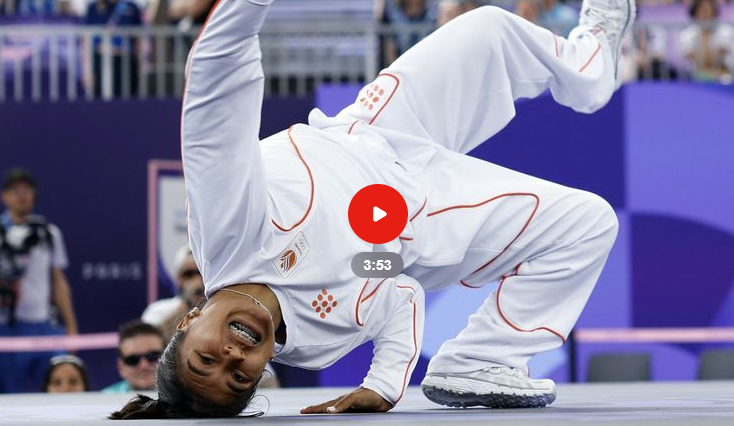Breaker India Sardjoe did not win a medal at the Olympic Games. The 18-year-old from The Hague lost to a Chinese breaker whom she had defeated earlier in the evening with a large margin. B-girl 671 (real name: Liu Qingyi) won the bronze medal after winning over more judges than Sardjoe in two of the three rounds. In the group stage, early in the evening, B-girl India won in every round of 671.
In breaking, popularly known as breakdancing, it is disastrous for your score if you show the same moves multiple times. So it could well be that 671 did not show the back of her tongue in the group stage. That also makes breaking a very tactical game: do you dare to gamble and risk an early elimination, or do you choose a possible deficit in the final round. Each dancer makes a different decision.
Read More : Woede bij Duitse hockeyers na provocatie Telgenkamp: ‘Meest onsportieve ooit’
My Landing page : https://heylink.me/sabrina-zahira
Sardjoe said she also ran into that. “I don’t know exactly where it went wrong, but the further you get in the competition, the more moves you’ve already used. As a result, you have fewer moves left.” “I think I still got the most out of it and I can be really proud of myself. I can think of a hundred thousand reasons why I didn’t win a medal, but I can also think: wow, I’ve come a long way.”
B-girls
Breakers go through life in their sport as B-boy or B-girl. Sardjoe’s alter ego is B-girl India. A breaker can make that name as crazy as he or she wants. That is why the Chinese Liu Qingyi is listed as ‘671’ in the official results. B-girl India started her tournament very well. In the preliminary round she had all the judges on her side in all rounds and she was also untouchable in the group stage.

In the quarter finals she lost a round for the first time, after which a slight decline became visible in Sardjoe. In the semi finals it went wrong and she lost 2-1 to B-girl Ami from Japan. The scores are compiled by nine judges who each judge the round. If five or more judges vote for you, you win the round.
Political statement
Early in the day, Sardjoe fought a duel with Manizha Talash, from the Olympic refugee team, to qualify for the group stage. Sardjoe won that match all three rounds with 9-0. Talash seemed to be making a political statement during her breakdance. She pulled out a cape that said ‘Free Afghan Women’.
What is breaking
Breaking is a dance sport in which participants compete against each other in a duel. At the end of a battle, the jury decides who of the two has won. The athletes cannot prepare a specific dance, as they do not know in advance what music will be played. Dancers are judged on strength, musicality and creativity. Because of the latter, you are not supposed to repeat moves.
New sports are introduced at every Olympic Games. In Paris today, that is breakdancing. Although the athletes themselves do not call it that. “Traditionally, it is called breaking . In the 80s, the media called it breakdancing, so that people understood what it was,” says team manager Joris van Neerbos in RadiOlympia .
Three breakers are participating for the Netherlands: India Sardjoe, Menno van Gorp (see photo) and Lee-Lou Demierre. They have prepared well, says Van Neerbos, who joined RadiOlympia together with technical director Paul van Dal.
Breaking originated in the United States in hip-hop culture. At parties, people danced during ‘breaks’ in the music. Dancers tried to outdo each other with their dancing skills. “The competitive aspect has always been there,” says Van Dal. “Outdoing each other with moves is something we see to this day and now even in Paris.”
Breaking is not a prepared dance, like rhythmic gymnastics for example. The music to be danced to is not known in advance. “The moment you start doing your first steps, you only know what music. The DJ decides on that. The dancers have to be very musical”, says Van Dal. The jury ultimately decides who wins: they also pay attention to originality, for example.
Although many people will not associate breaking with our little country, the Netherlands has a good chance of winning medals, say Van Neerbos and Van Dal. “We are not coming here to compete, we are coming here as serious title candidates”, says Van Dal. And that is not unthinkable, adds Van Neerbos: “India Sardjoe is world champion, Menno van Gorp is world champion twice and Lee-Lou Demierre has won the last two qualifying tournaments.”
However, the competition is also strong, both gentlemen believe. “We know that Japan, America, China and Italy have also prepared well.” India Sardjoe will be in action today around 16:00, in the first ever breaking battle at the Olympic Games. She has to do a qualifier to get into the group stage.
The Olympic Games on NPO Radio 1
From Friday 26 July to Sunday 11 August you can follow the Olympic Games live from Paris at RadiOlympia . Between 09:30 and 23:00 you don’t have to miss anything of the biggest sporting event in the world. With match reports, updates and all the news about the Games and the athletes. In addition, RadiOlympia tours throughout the Netherlands and delves into a different Olympic sport every day. This series can be followed on the radio as well as on Instagram and YouTube. A new episode of the NOS Olympic Podcast also appears every morning in the NPO Luister app and on YouTube.

Pingback: Japan’s b-girl Ami wins Olympic breaking’s first gold medal - smartoobiz.com